- Home
- Cynthia Kadohata
The Thing About Luck Page 15
The Thing About Luck Read online
Page 15
“I’m going to have to dump at the elevator. They’re open late because of the rain this weekend. Do ya want to come with me or are ya okay by yerself?”
I didn’t answer at first. I searched inside myself and decided that my need to keep cutting trumped my fear of being alone.
“Summer?”
“No, I’ll be fine working out here.”
But a minute after he drove off my heart started to go whompa, whompa. I was suddenly terrified out there by myself. I idled the combine and watched as the big rig’s taillights disappeared in the distance. I sat very still, then turned off the ignition. I laid my arms on the steering wheel and my face on my arms, and pressed my eyes closed. I was so, so scared. I remembered a night several years earlier when I had a dog who was killed by a truck on the highway, and as I held him I thought I was going to lose my mind. That’s kind of the way I felt right then, like everything that was real—the black sky and the stars and the wheat—all started to kind of melt into one another, and the only thing that seemed clear was me and a dog. Whompa, whompa. “Thunder, help me. I’m scared,” I said, looking at him. He lifted his head curiously, then sat up and placed his paw on my leg.
I suddenly burst into sobs, and the next thing I knew, I wasn’t sobbing because I was scared, but because my grandparents worked so hard and because Jaz couldn’t make a friend at school and because I knew how desperately my parents wished for their own business, and I doubted they would ever get their wish.
I squeezed onto the floor and hugged Thunder to me. As I hugged him something unfamiliar welled up inside of me. Maybe it was courage. I mean, this was my world, the black sky and the stars and the wheat. I knew this world backward and forward and up and down. I got back into my seat and looked around at the wheat. Something started to happen: The dust of my personality started to settle, and my fear left me. In its place was the hyper-superalertness from yesterday.
I turned on the ignition and got back to work.
When my bin was full, Mick still hadn’t returned. I turned off my combine and waited for him.
He got back in an hour and called me on the radio. “I’m back. There was a bit of a line at the elevator. Are ya full?”
“Yes.”
“I’ll dump for ya. Why don’t ya go on back to the motel? I’m thinking of quitting myself.”
“Do you want me to help you clean the combines?”
“Naw. Go get yer sleep.”
“Okay, ’night!” I said. And that’s when excitement flooded into me. I hadn’t made any mistakes today! I wanted to jump up and touch the sky.
I parked the combine where I had found it and walked home.
One of my flip-flops broke, so I walked barefoot in the middle of the road to avoid stepping on gravel. I walked exactly in the middle because that somehow made me feel kind of like I was celebrating or in a movie or something. I was so happy. I loved how quiet it was out, how the breeze brushed my face, and how the road felt soft under my feet. Bugs touched my face like snowflakes.
When I reached the motel, I snuck into the room. Even Obaachan seemed to be fast asleep. I changed into a T-shirt without showering—too bad, EPA!—and eased myself into bed beside Jaz. Thunder jumped on top of me. An hour went by. I couldn’t sleep. I felt wired. I gave up trying to sleep, got my keycard, and went to sit outside and look at the stars. Thunder followed me out.
I was startled to see Mick sitting on the curb down the way. “You finished cleaning the combines?” I asked.
He shook his head no. “I ran out of water.” He held up a couple of bottles of water from the vending machine. He took a swig and said, “Ya did good tonight. Yer grandparents are going to think I’m Superman when it comes to cutting.”
“Thank you.”
He sighed heavily, then looked up toward the stars and sighed again. “When my girl still loved me, she made me a quilt of the constellations. She’s handy with a sewing machine.”
I didn’t reply.
“I wanted to marry her.”
“She doesn’t love you anymore?”
He shook his head again. He seemed really sad and rubbed his palms over his face and into his hair.
I didn’t know what to say. I didn’t know much about that stuff, except from my brief experience with Robbie. “I’m sorry.”
“Don’t be sorry, then. Being on a different continent has taken my mind off her quite a bit.” He stood up and stretched. “I best be finishing my work.”
“Okay, then good night,” I said.
“Get some sleep.”
I went inside, but I peeked back outside and saw Mick had sat back down. A few thin clouds passed in front of the moon. Soon it would rain. I hoped we would finish the field in time. If we did, it would be because of me, partly. I smiled a little smile and immediately felt guilty about being happy when Mick was so sad. I gently pushed the door shut.
I took a few silent steps.
A voice came out of the darkness. “You wake me up.” Jiichan.
“I’m sorry,” I said. “I tried to be quiet.”
“When sick, not much difference between asleep and awake.”
“Are you still really sick?”
“You use word ‘really.’ ” He thought a moment. “No. I still sick, but not ‘really.’ ”
“A little better?”
“Yes, I think a little better.”
“I just stepped out for some fresh air. Mick was sitting out there, so we talked a little. I’m sorry I woke you up.”
“I felt you walk in. No hear you. That woke me up.”
“Obaachan was crying earlier,” I blurted out.
“She been very sad.”
“Because of all our bad luck?” I asked.
“No. Today in combine she say you growing up so fast, and she no could stop crying.”
I stared at him for a moment. What did that mean?
Just then Obaachan chuckled in her sleep, no doubt over a dream of America’s Funniest Home Videos. She said that was the only thing she ever dreamed of. Then something else about growing up occurred to me.
“Jiichan, can you be in love when you’re only twelve?” I asked suddenly.
“You can be in love, but it the kind of love that go away, not kind that stay.”
“How come it doesn’t stay?”
“Why? You want to get marry?”
I thought this over. “No, I guess not yet. I mean, not for, like, twenty years. But . . . can’t you be in love and not want to get married?”
I heard him making a small noise in his throat. When he was thinking really hard, sometimes he made a soft, squeaky sound. “Temporary love very beautiful thing. In Japan, thing that don’t last called tsukanoma. Tsukanoma very beautiful, like cherry blossom. Perfect.”
Jiichan paused. “Wabi-sabi beautiful too, in different way.” Once, Jiichan had made me watch a BBC show about wabi-sabi that he’d recorded. It’s very hard to determine what wabi-sabi is, because supposedly if you could define it, then you knew it couldn’t really be wabi-sabi. It’s kind of important to what it means to be Japanese, and yet hardly anybody knows exactly what it was. It kind of means that there can be beauty and nobility inside of a rough exterior. “Another thing. When you get marry, it like great Shinto shrine of Ise. It many hundreds of years old, but for all those hundreds of years, they rebuild it every twenty years. In temporary love, no rebuilding.”
“If I tell you something, do you promise not to tell Obaachan?”
“I make solemn promise.”
“I think I was in temporary love with Robbie Parker.”
“First time I in love was Akiko. I same age as you.”
“How long did you stay in love?”
“Five week. I never speak word to her in life, but I in love.”
“How come you stopped loving her?”
“Orchid interesting flower. Some cherry blossom last only one week. Orchid can live many month. She was like cherry blossom.”
“You mean you
r love withered away?”
“No wither, it fall off tree.”
“Why did it fall off the tree?”
“I don’t know. Maybe wind blow it off.”
Then, just for the nosy heck of it, I asked, “Do you love Obaachan?”
“God put us together. That bigger than love. I tell you story. Jaz, you listen?”
“Yep,” Jaz answered.
“You’re awake! You tricked me!”
“I didn’t trick you. Nobody asked me if I was awake.”
“Listen to story,” Jiichan said. He cleared his throat. “One day my brother and me have many work to do. But we decide to run away for just one day. We get our fishing poles and go to lake. We catch many fish. Nice day—overcast, so we don’t get hot, but not cold enough for sweater. Many day my brother and me fight, but this day we like best friend. Then we go home and say, ‘Look at all the fish we catch!’ We excited. But we didn’t do our chores that day. My father get switch and hit our legs until we cry. My brother get hit more than me because he older. Altogether, my brother live almost seventy year—that equal more than twenty-five thousand day. I with him at bed when he die. He say to me, ‘Remember that day we run away and go fishing?’ I tell him I remember clearly. ‘Wasn’t that day fun?’ he say. I say, ‘Yes,’ and then he die. Oyasumi.”
“Oyasuminasai, Jiichan,” Jaz and I said.
I cracked the door again and peeked out. I could see Mick still sitting on the curb. I watched him a long time. Then he looked up at something in the distance, and I turned to see what it was. It was a pair of combines driving side by side, their headlights illuminating the night. He had come across the ocean to drive one of those and forget about a girl he loved. I felt surprised. What I felt surprised about was how beautiful hard work looked—the combines moving slowly in tandem, the moon hanging over the field. It was wabi-sabi.
I knew going out to talk to Mick now wouldn’t make him feel better. A twelve-year-old girl didn’t mean a hill of beans to him. I couldn’t help. It was just like we couldn’t help Jaz to make friends at school, and just like I couldn’t change Jenson’s life with a simple hello. Still, as my dad liked to say, “You do what you can do.” Maybe I would talk to Jenson again. Maybe I would keep looking for friends for Jaz back home.
I got back into bed, and as soon as my head hit the pillow, I knew something: Our year of bad luck had ended. It had begun when I caught malaria, and it had ended here tonight. Maybe I’d known that earlier, and that was why I had walked down the middle of the highway so happily. Anyway, I needed to get some sleep, because I’d have another long night tomorrow. I closed my eyes and saw the header, spinning . . . spinning . . . spinning.
ACKNOWLEDGMENTS
I’m deeply indebted to George Miyamoto for his big, big heart and also to Caitlyn Dlouhy—I’m quite certain there is no better editor than her in New York. Thanks as well to everyone at Simon & Schuster, including publisher Justin Chanda; Ariel Colletti; Russell Gordon, who creates such glorious covers; and managing editor extraordinaire Jeannie Ng. I’m also indebted to überagent Gail Hochman and to copy editor Cindy Nixon, who has been keeping me out of trouble for almost ten years.
Two harvesters were of incalculable help: Wendy and Taff Hughes, including their kids Shiani, Mikey, and Zeb, as well as all of Hughes Custom Harvesting, who let me visit with them in Kansas; showed me around Childress, Texas; annnnnd let me badger them constantly—talk about generous! Jenna Zeorian of Zeorian Harvesting spoke with me, patiently answered numerous e-mails, and read the manuscript multiple times. Are all harvesters this wonderful?
I’d also like to express appreciation for others who helped me with the research for this book. In alphabetical order: Dr. Lisa Blum, child psychologist; mosquito expert Richard Lampman, PhD, Entomology; Irish combine driver Rob Langley; Reiko Lee, who read the whole manuscript to check my Japanese; Yuki Nyhan, who also helped with the Japanese; Cyrene Puccio, who once caught malaria and who shared her experiences with me; Keith Sharpe, who, like Rob, checked the Irish idioms; and Japanese speaker Asako Suzuki.
—C. K.
CYNTHIA KADOHATA actually rode a 30,000-pound combine to write this novel. She is the author of the Newbery Medal—winning Kira-Kira; Cracker!: The Best Dog in Vietnam; Weedflower, which won the 2007 PEN Center USA Literary Award for Children’s Literature and the Jane Addams Children’s Book Award for Older Children; Outside Beauty; A Million Shades of Gray; and several critically acclaimed adult novels, including The Floating World. She lives with her son and two dogs in Covina, California.
Also by Cynthia Kadohata
ATHENEUM BOOKS FOR YOUNG READERS
New York / Simon & Schuster
Meet the author, watch videos, and get extras at
KIDS.SimonandSchuster.com

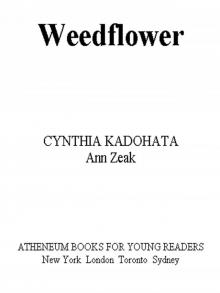 Weedflower
Weedflower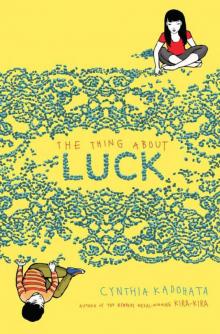 The Thing About Luck
The Thing About Luck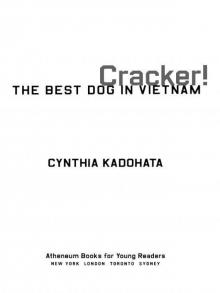 Cracker!: The Best Dog in Vietnam
Cracker!: The Best Dog in Vietnam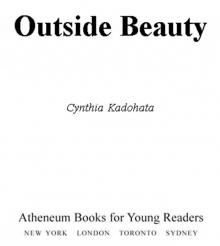 Outside Beauty
Outside Beauty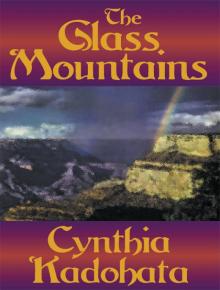 The Glass Mountains
The Glass Mountains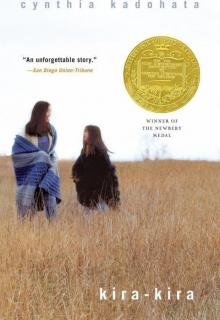 Kira-Kira
Kira-Kira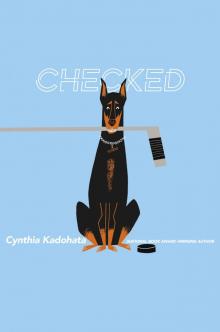 Checked
Checked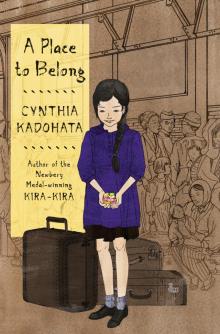 A Place to Belong
A Place to Belong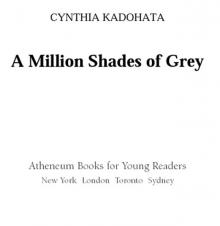 A Million Shades of Gray
A Million Shades of Gray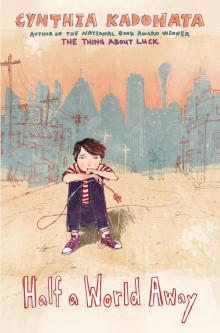 Half a World Away
Half a World Away